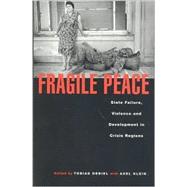
| Boxes, tables and maps | ix | ||||
| The Development and Peace Foundation | x | ||||
| Notes on the contributors | xi | ||||
| Abbreviations | xv | ||||
| Foreword | xvi | ||||
|
|||||
| Introduction Do Crisis Regions Have a Chance of Lasting Peace? The Difficult Transformation from Structures of Violence | 1 | (3) | |||
|
|||||
|
4 | (3) | |||
|
7 | (1) | |||
|
8 | (7) | |||
|
15 | (10) | |||
|
25 | (6) | |||
| PART ONE State Failure and the Transformation of War-torn Societies | 31 | (56) | |||
|
33 | (23) | |||
|
|||||
|
35 | (1) | |||
|
36 | (3) | |||
|
39 | (2) | |||
|
41 | (1) | |||
|
42 | (4) | |||
|
46 | (2) | |||
|
48 | (4) | |||
|
52 | (4) | |||
|
56 | (16) | |||
|
|||||
|
57 | (2) | |||
|
59 | (6) | |||
|
65 | (2) | |||
|
67 | (5) | |||
|
72 | (15) | |||
|
|||||
|
73 | (4) | |||
|
77 | (2) | |||
|
79 | (3) | |||
|
82 | (5) | |||
| PART TWO Crisis Regions between Violence and Development | 87 | (102) | |||
|
89 | (21) | |||
|
|||||
|
89 | (4) | |||
|
93 | (2) | |||
|
95 | (1) | |||
|
96 | (2) | |||
|
98 | (3) | |||
|
101 | (2) | |||
|
103 | (1) | |||
|
104 | (2) | |||
|
106 | (4) | |||
|
110 | (19) | |||
|
|||||
|
112 | (2) | |||
|
114 | (4) | |||
|
118 | (1) | |||
|
119 | (3) | |||
|
122 | (7) | |||
|
129 | (17) | |||
|
|||||
|
130 | (3) | |||
|
133 | (4) | |||
|
137 | (2) | |||
|
139 | (2) | |||
|
141 | (5) | |||
|
146 | (10) | |||
|
|||||
|
147 | (2) | |||
|
149 | (1) | |||
|
150 | (2) | |||
|
152 | (4) | |||
|
156 | (15) | |||
|
|||||
|
161 | (2) | |||
|
163 | (4) | |||
|
167 | (4) | |||
|
171 | (18) | |||
|
|||||
|
172 | (2) | |||
|
174 | (1) | |||
|
175 | (2) | |||
|
177 | (2) | |||
|
179 | (4) | |||
|
183 | (2) | |||
|
185 | (4) | |||
| PART THREE Regional Conflict Management in the Light of September 11 | 189 | (22) | |||
|
191 | (20) | |||
|
|||||
|
192 | (4) | |||
|
196 | (3) | |||
|
199 | (3) | |||
|
202 | (9) | |||
| EPILOGUE `New Realism' or `New Development': Meeting the Challenges of Identity Conflicts, Organized Crime and Transnational Terrorism | 211 | (16) | |||
|
|||||
|
|||||
|
211 | (2) | |||
|
213 | (3) | |||
|
216 | (4) | |||
|
220 | (7) | |||
| Index | 227 |
The New copy of this book will include any supplemental materials advertised. Please check the title of the book to determine if it should include any access cards, study guides, lab manuals, CDs, etc.
The Used, Rental and eBook copies of this book are not guaranteed to include any supplemental materials. Typically, only the book itself is included. This is true even if the title states it includes any access cards, study guides, lab manuals, CDs, etc.